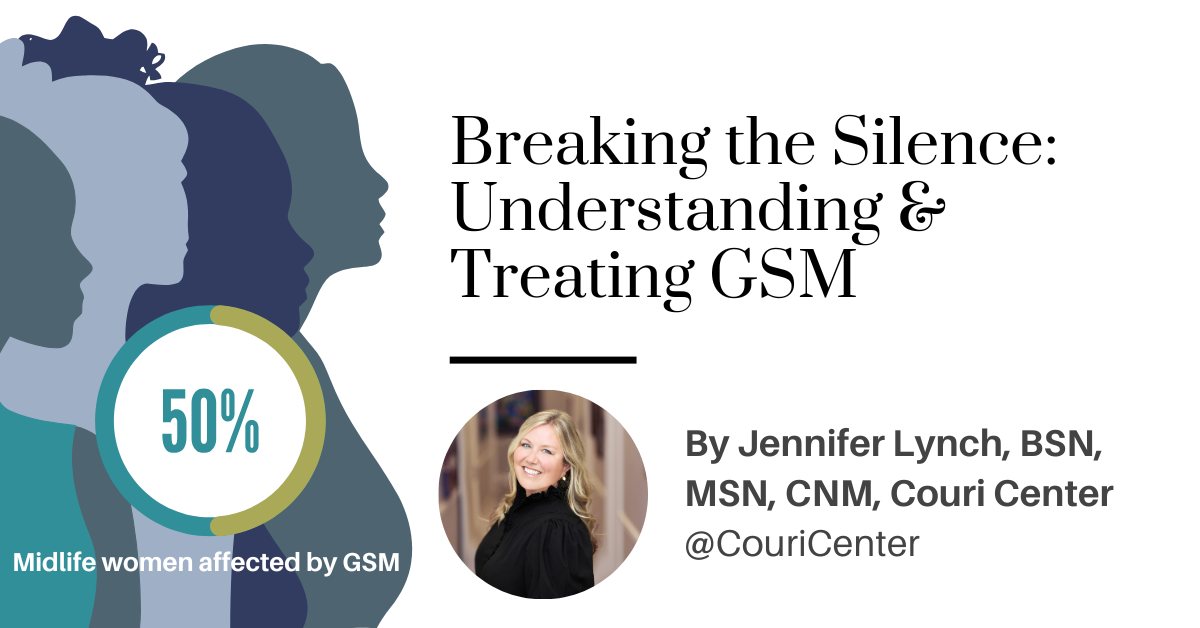
Summary
Discovering Relief: Understanding and Treating Genitourinary Syndrome of Menopause (GSM)
Menopause marks a transformative phase in a woman’s life, but for over half of midlife women, it brings an often-overlooked challenge: Genitourinary Syndrome of Menopause (GSM). Unlike hot flashes, which tend to fade over time, GSM symptoms—such as vaginal dryness, irritation, painful intercourse, and urinary urgency—worsen without treatment, silently impacting relationships, confidence, and daily life. Many women hesitate to discuss these symptoms, unaware of the safe, effective options available. At the Couri Center, we provide compassionate, personalized care to help women rediscover comfort and vitality. Don’t let GSM define your midlife—learn how tailored solutions like MonaLisa Touch Laser Therapy and hormone treatments can transform your health and quality of life.
Genitourinary Syndrome of Menopause, or GSM, describes the genital, sexual, and urinary symptoms that can impact a woman’s quality of life in menopause. These symptoms are due to a natural decline in estrogen and testosterone hormones as we age. In the United States, women live longer, healthier lives, meaning that a woman can spend one-third of her life in the postmenopausal stage.
Menopause and GSM: A Natural Yet Manageable Transition
Menopause-related GSM affects over 50% of midlife women. While the most commonly known complaint of menopause—hot flashes—tends to decrease over time, GSM symptoms tend to worsen and, unfortunately, will not change or improve without treatment.
Could You Have GSM? Key Symptoms:
- Vaginal dryness
- Dyspareunia (painful intercourse)
- Vaginal and vulvar irritation
- Vaginal and vulvar burning
- Vaginal and vulvar itching
- Vaginal and vulvar tenderness
- Post-coital bleeding (bleeding after intercourse)
- Urinary urgency, recurrent urinary tract infections, and leaking urine
- Low sexual desire
GSM’s Impact on Relationships, Mental Health, and Daily Life
These symptoms can cause stress, impact relationships and daily activities, affect body image, and even create anxiety and depression in women as they age.
Why GSM Goes Untreated: Breaking the Silence
By identifying the signs and symptoms of GSM, appropriate management can be initiated to preserve the urogenital health of women. Despite many therapies and treatments, both hormonal and non-hormonal, several studies have shown that GSM symptoms are underreported, underdiagnosed, and therefore undertreated. Many women are unaware of the safe and simple treatment options available to them.
Vaginal and Sexual Symptoms: Let’s Talk About It
Vaginal and sexual symptoms can feel difficult to discuss with a healthcare provider. Women may feel nervous, embarrassed, or unsure of bringing up the many symptoms of GSM during their appointments.
Effective Treatment Options for GSM
There are many treatment options for GSM, which include:
- Over-the-counter lubricants and vaginal hydrators
- MonaLisa Touch Laser Therapy
- Local and systemic hormonal therapies
- Pelvic floor physical therapy
How the Couri Center Can Help With GSM
Here at the Couri Center, we are here to listen to your concerns and can help create a treatment plan to ease GSM. New patients are always welcome. Schedule online below or call 309-692-6838.
-Jennifer Lynch
CONTACT US-ARTICLE
Disclaimer: The information provided on this website is intended for general informational purposes only and is not a substitute for professional medical advice, diagnosis, or treatment. The information is current as of the date of publication or last review; however, medical knowledge is constantly evolving, and the information may become outdated over time.
References
Sexual Health in Menopause. Irene Scavello, Elisa Maseroli, Vicenza Di Stasi, Linda Vignozzi. Medicina (2019), 55 (9), 559
The role of androgens in the treatment of genitourinary syndrome of menopause (GSM): International Society for the Study of Women’s Sexual Health (ISSWSH) expert consensus panel review. Simon, James A. MD, Goldstein, Irwin MD et al. Sex Med Rev 2018:6:558-571
The role of hormone therapy in urogenital health after menopause. Rosella E Nappi, Laura Cucinella, Ellis Martini, Chiara Cassani. Best Practice & Research Clinical Endocrinology & Metabolism 2021, Vol 35, Issue 6
